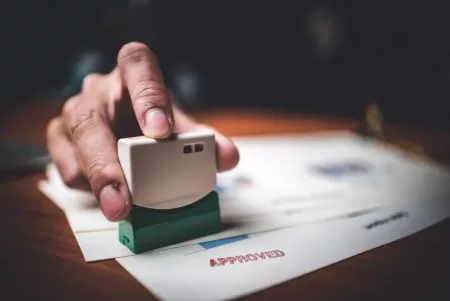Licensing Agreement in Washington DC
Licensing agreements can be tricky, especially if you don’t know your way around one, even more so if you are an online business.
If you are licensing something for your business in the Washington DC area, you need a licensing agreement lawyer to help you out. There are many pitfalls and legal issues that must be addressed, especially if it is your first time trying to set up a licensing agreement or you do not know what to keep in mind when drafting the terms of the license. You need someone who knows the field inside out, so they can guide you through the right path and avoid costly mistakes that could have been avoided otherwise.
You need the hands-on help of a Licensing Agreement Attorney at WAR IP Law, who is experienced in handling similar matters. Our experienced, knowledgeable licensing attorney will provide you with all the necessary help and advice, give you valuable suggestions and make sure you get everything sorted out with your business partner in the best possible manner. We will assist you in obtaining patents, trademarks, copyrights, and other forms of intellectual property protection.
By choosing us as your Licensing Agreement legal partner, we can help you resolve your issue as soon as possible and in the most cost-effective manner.
What Does Licensing Mean?
The word “license” has two definitions, one in everyday language (such as a driver’s license) and one in business and commerce. A license is comparable to permission to do something in its broadest definition.
In business, licenses are often granted by a corporation that is willing to exchange cash for the use of its property. Typically, these rights allow the firm to manufacture, sell, or utilize its own property.
Licensing Types
 Typically, intellectual property (IP) such as trademarks, copyrights, and patents are involved in licensing. Digital assets such as software and trademarks, as well as music rights, are licensed.
Typically, intellectual property (IP) such as trademarks, copyrights, and patents are involved in licensing. Digital assets such as software and trademarks, as well as music rights, are licensed.
Let’s look at some of the most common types of license agreements:
- Trade secret licenses: Specify how, where, and when you may utilize a company’s trade secrets.
- Trademark licenses: Specify how you may use a trademark.
- Patent licenses: Outline your right to sell, use, manufacture, distribute, and export a patented product.
- Copyright licenses: Specify your legal right to duplicate and sell a copyrighted item.
Here are a few examples:
- Teams offer trademark licensing to firms that create products with the team’s logo.
- A movie studio offers rights to firms that make merchandise based on the movie’s copyrighted characters.
- Trademark licenses allow firms to use a well-known trademark on certain goods and in particular ways.
- Licenses for trade secrets include the right to sell methods, maybe incorporating them into applications.
- Copyright licenses provide the right to reproduce and sell the protected property, including derivative works (works based on the original work). The right to publicly perform the work may be licensed.
- Patent licenses are required to manufacture, sell, use, distribute, and export patented items.
Agreement on Licensing in Washington, D.C.
The licensee and the licensor are the two people who sign a licensing agreement. The licenser lets the licensee use a brand name, trademark, or patented technology and make and sell goods that belong to the licenser. A license is “an official permission to own or use something in a broad sense.” Also, the person who owns the intellectual property often uses a license agreement to make money off of it. Depending on the type of business, a licensing agreement can cover many legal grounds.
Considerations for Creating a Licensing Agreement
It is essential to be diligent while writing a license agreement to protect yourself and your organization. Both the licensee and the licensor must genuinely understand what they are signing. Before you begin, consider the following information and guidance:
Consult a contract lawyer. They know to assist you in developing a fair license arrangement that works in your best interests. Similarly, they are familiar with the formatting and legal terms to guarantee that the document may be used in court if required.
Determine your ownership. Before granting a license for anything, you must verify that you own it. For example, if you have a trademark, ensure that it is registered. Another thing to be sure of is that no one else is already utilizing the asset and claiming ownership of it.
Be prepared to deal with ownership conflicts. Make sure your contract specifies what would happen if someone challenged your ownership. For example, what if someone claims to hold copyright over something you believe you have the right to license? Similarly, you must know what steps to take if someone plagiarizes material covered by this license.
Pay attention to what is stated. If you have any questions about the contract, be sure to inquire. Each sentence must make sense to understand what you are committing to completely.
Discuss royalties as soon as possible. Finally, money is at the heart of almost all license arrangements. Ensure to address the payment of royalties in a variety of possible scenarios. For example, if you have a 30% royalty, talk about what would happen if the licensee did not meet the predicted sales.
Keep in mind federal restrictions. It is not entirely up to the parties involved to choose how a license agreement functions. You must also obey appropriate regulations, which may differ depending on your license.
Consider how taxes will be implemented. When you pay royalties, you may be allowed to deduct them from your taxes as a business cost. Consult with your tax advisor to discover how to report these costs correctly.
Licensed brand benefits
Many businesses know that licensing their brands can be beneficial, from large corporations to small independent artists. Think about some of these big pros:
Increase earnings without incurring cost risk: You may receive royalties without engaging in manufacturing, marketing, or distributing the items.
Enhance brand recognition: If you aren’t already a big name in your field, more people seeing your licensed products will help you become one. And if you are well-known, you can increase your visibility by going into other markets through licensing.
Expand your business internationally: Licensing allows you to enter other markets without incurring additional taxes or the headaches and stress of establishing connections with retail outlets or distributors in foreign countries.
How does a Licensing Agreement Attorney help with licensing?
Define licensor and licensee in an agreement.
A licensor grants rights for the usage of licensed items. In contrast, a licensee is a person using intellectual property rights that another party chose to provide (for a period that both agree to). Licensees must exercise great caution to guarantee that they are negotiating and licensing rights from the legitimate owner and not a third-party deceiver.
Discuss license terms
You must follow copyright rules while licensing or preparing to license rights. Licenses are legal contracts. Thus, parties may sue you if the IP license the licensee agrees to is not statutory. Occasionally, this occurs. Getting sued for improper usage or illegal agreements is the last thing you want.
Explain how licensors award licenses.
A license agreement may include patents, trademarks, and copyrights. Licensor and Licensee may negotiate licensed technology. This would likely entail a license to utilize a patent commercially (for reproducing particular items), which the license grant must rigorously restrict.
Compare trademarks, patents, and copyright licenses.
Trademark licensing negotiations are usually straightforward and regulated by relevant regulations. Patent licensing includes producing and distributing patented products. This must follow patent licensing agreement restrictions. Finally, a copyright license includes copyrighted and derivative works.
Make sure the license is legal
A party that can’t manufacture and sell a good patented product may license non-exclusive or exclusive rights to another party. A qualified IP lawyer can assist you in determining whether to give a royalty-based or flat license price. Both may have limits in your circumstance.
Need help with a License Agreement? Get in touch with our licensing agreement lawyer at WAR IP Law.
If you’re looking for help with a license agreement, get in touch with our licensing agreement lawyer at WAR IP Law. We have years of experience helping businesses like yours get the most out of their intellectual property and we would be happy to put that expertise to work for you. We can provide you with the resources and advice you need to create a legal document that will protect your intellectual property and help you do business successfully. Don’t wait – contact us today to get started!


